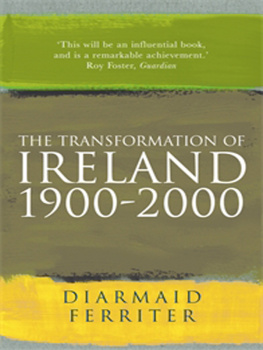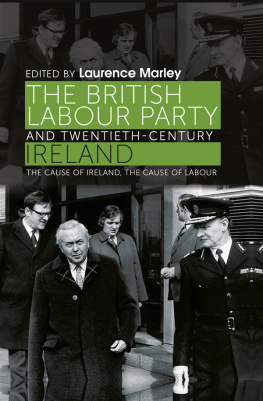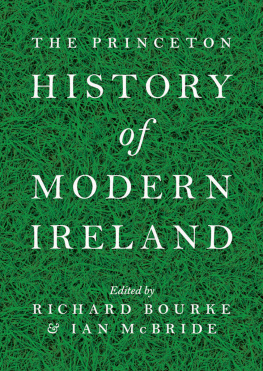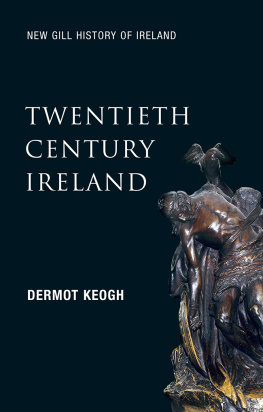What If?
Alternative Views of Twentieth-Century Ireland
Diarmaid Ferriter
Gill & Macmillan
For Peter Mooney and for Tom and Anne Maher
Contents
Introduction
An extravagance of the imagination?
In the autumn of 2003, I presented a new RT radio series called What If? in which some of the key events, personalities and milestones of the twentieth century were assessed by means of looking at possible alternative endings. Over the course of the following eighteen months, 35 such programmes were broadcast, covering social, political, economic, cultural and sporting matters.
It was a concept some academics may have baulked at. Professional historians can sometimes be distinctly uncomfortable, if not utterly cynical, about the notion of speculating on alternatives, or counterfactual history as it is formally described. A typical response to those intent on speculating is why bother? as nobody knows what would have happened, and the possibilities are endless. Another angle on this is that there are very sound reasons for not exploring what ifs; historians have enough to be doing finding out what actually did happen, and need to concentrate their energies and research skills on locating sources and information that will shed light on the facts; that even with events that we believe have been well documented, there will always be more information to be uncovered to relay adequately what actually did happen.
It is an understandable scepticism that has been articulated quite fiercely by some well-known historians. In 1997, a book edited by Niall Ferguson was published, entitled Virtual History: Alternatives and Counterfactuals, in which leading historians speculated on, amongst other things, England without Cromwell, the First World War without British involvement, the enactment of Home Rule in Ireland in 1912, a German invasion of Britain in May 1940, 1989 without Gorbachev, and no assassination of John F. Kennedy in 1963.
In his introduction, Ferguson detailed some criticisms that had been made about forays into counterfactual history. He quoted E. H. Carr who maintained that it was a mere parlour game and a red herring; that history is a record of what people did, not what they failed to do. The assessment of the English philosopher, Michael Oakeshott, was also cited:
The distinction... between essential and incidental events does not belong to historical thought at all; it is a monstrous incursion of science into the world of history... a pure myth, an extravagance of the imagination.
The historian E. P. Thompson was more succinct, but certainly no less damning. The whole counterfactual exercise, he suggested, was unhistorical shit. For the purists, perhaps it is, but for many more, it can be enormously entertaining and illuminating, particularly when the speculations of the radio programme are based not on wild flights of fancy, but on very real possibilities, or documentary evidence from an archive, and when the programmes guests are not just from academic history departments, but include journalists, novelists, economists, politicians, musicians, priests and community activists. History, after all, is far too important to be left to historians. The great R. B. McDowell of the history department at Trinity College Dublin, still striding about Dublin city as a nonagenarian at the beginning of the twenty-first century, warned some years ago that there can be the danger of getting into a closed room in which the experts chat to and fro and impinge very little on the outside world. I do not want to see history in that room. Neither did those involved in this programme.
It also seemed to me that the programme was an effective way of humanising historyreflecting on the achievements and failures of Irish independence, the progress made and the lost opportunities, and the manner in which individuals related history to their own lives and experiences. It is surely one of the functions of historians to keep asking questions as well as attempting to answer them; to continue to question their own assumptions.
Put the guests into a studio for a live discussion on a Sunday morning and the results can be very satisfying for both participants and listeners. Some were solemn, some whimsical or satirical and some facetious; but what they all had in common was a willingness to explore, speculate and discuss the significance of what actually had happened. One of the added advantages was that many of the guests had been active participants in the events and controversies under discussion and were able to give a good insight into how past and present intersect.
Often, the what if question was simply used as a starting point or a springboard for a general discussion of seminal moments in twentieth-century Irish history; some programmes were based on a single what if; others threw out a whole host of them. The producer of this series, Peter Mooney, spent many hours in the RT archives, sourcing the archival clips that punctuated the shows, in order to give listeners a sense of times past, and to illuminate the discussions between the two guests and myself each week. We could have had more, but felt that to allow a free-flowing discussion, two would suffice.
Despite the scepticism documented by Ferguson and others, many leading Irish historians have indulged in the counterfactual exercise, either implicitly or explicitly; indeed, one of the main features of the revisionist debate that influenced the writing of Irish history from the 1970s onwards was the contention that the Irish revolution in the 191621 period was unnecessary; that independence could have been achieved by constitutional means and without the bloodshed of the War of Independence. Even when not writing an essay in counterfactual history, historians and political scientists have often found it necessary to speculate in order to fine-tune their assessment of what actually did happen. In 1991, in a publication to mark the 75th anniversary of the 1916 Rising, Tom Garvin, Professor of Politics at University College Dublin, and a regular guest on the programme, wrote the following:
There is a common argument to the effect that the violent birth of modern Independent Ireland was in some way foolish and unnecessary, because the democratic politics of consensus, reasoning and bargaining would have achieved independence more easily and without bloodshed. Let me speculate briefly on what might have happened had the Rising not taken place. With the arrival home of the veterans in 1919, and with the discredited Redmondites still holding on in Westminster, armed nationalism (which would have returned from the trenches with rather pronounced opinions about the British establishment and its right to rule anybody) would have been alienated fatally from constitutional nationalism. An incoherent but vicious sectarian war between North and South, with no new generation of political leaders in place, could easily have occurred. The Rising redefined the quarrel as one between two vaguely defined entities, England and Ireland, rather than one between Catholics and Protestants.
The renowned historian of Ulster unionism, Alvin Jackson, contributed an essay of over 50 pages to the Ferguson book, speculating on what would have happened if home rule had been imposed on Ireland in 1912, noting that the 1912 Bill, suitably presented, had a greater chance of success than its predecessors [in 1886 and 1893], and is therefore an intellectually more valuable focus for counterfactual speculation. He concluded that the price paid by all the Irish for a unitary state might well have been higher than the price paid for partition; an unstable thirty-two county Ireland, as opposed to an unstable six-county Northern Ireland... had Ulster Unionists been eased into a home rule Ireland, then it is just conceivable that a stable pluralist democracy might have swiftly emerged. But it would have been a high risk strategy, with every possibility that a short-term political triumph for Liberal statesmanship might have been bought at the price of a delayed apocalypse.
Next page





